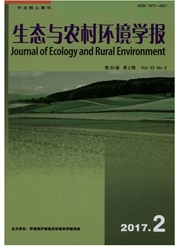

 中文摘要:
中文摘要:
利用冬季沉水植物菹草构建由浅水到深水的串联系统,含沙水依次流经浅水区和深水区,测定各级菹草对水体悬浮泥沙含量和沉降量的影响。结果显示,菹革系统可以降低水体中悬浮泥沙含量,并随水力停留时间延长而降低程度加大。各运行条件下,菹革系统悬浮泥沙平均沉降量65.7g·m^-2,比对照组高39.4%。菹草表面泥沙的吸附是一个“吸附-沉降-再吸附’’的动态过程,吸附量为3.26—5.69g·kg^-1。菹草对冬季水生态系统的自净功能起着十分重要的作用。
 英文摘要:
英文摘要:
Submersed plant Potamogeton crispu, was used to construct a holistic system connecting the shallow layer to the deep layer of water. When sandy water flows through the shallow layer to the deep one, effect of P. crispus on concentration of suspended mud and sand (MS) in different depth layers and sedimentation of MS. Results show that P. crispu, reduced content of MS, and the longer they stayed with the flow, the greater the effect. The average settlement of MS in P. crispus system was 65.7 g · m^-2, 39.4% higher than in CK. MS sorption on the surface of P. crispus is a dynamic process of "adsorption-settlement-adsorption" ranging from 3.26 to 5.69 g ·kg^- 1, which was related to biomass per unit area of P. crispu,; Therefore, submerged plant P. crispus may play an important role in self-purification of water bodies in winter.
 同期刊论文项目
同期刊论文项目
 同项目期刊论文
同项目期刊论文
 期刊信息
期刊信息
